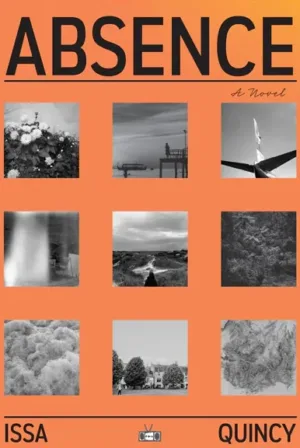Absence
by Issa Quincy
reviewed by Max Callimanopulos
Issa Quincy appears to have read a lot of W. G. Sebald. Across the six chapters of his debut novel, Absence, an unnamed narrator pores over fading photographs, letters, and tortured family histories; he walks in curiously depopulated landscapes and contends with the limits of language to express himself. This narrator, we quickly discover, is a wanderer of body and mind. He gets a job “solitarily sifting through crumbling collections of letters, articles, reports and photographs” at a museum. He investigates the painful histories of various acquaintances and frequently digresses to consider some “rather striking concrete arches” or a painting by Hendrick Avercamp. He examines the Turkish invasion of Cyprus and the Tunisian War of Independence; he describes bad dreams, foggy moorlands, a falcon on the hunt, and other Sebaldian artifacts. Like the narrators of The Rings of Saturn or Austerlitz, our narrator is inquisitive, educated, sensitive, and slightly aimless. Throughout Absence, he wrestles thoughtfully with memory, exile, and “irrevocable melancholy.”
This odd brew might be promising. Rachel Cusk, Teju Cole, Aleksandar Hemon, Jenny Erpenbeck, and Garth Greenwell have all absorbed some of Sebald’s tricky gravity and marmoreal chill. But the Sebaldian affect is a tough one to pull off. Sebald’s writing worked when it did because of a lightly worn erudition that scrupulously avoided anything that might locate it in the twentieth century. When it didn’t work, it came across as precious, bloodless, finicky, and almost entirely humorless. Absence may serve as a cautionary tale for any writer who has recently fallen in love with Sebald’s work: It borrows many of the trappings of his fiction, and in the process imports too many of its failings.
But first, the good: Quincy is a writer of unstinting sincerity. This is good because irony would undercut his method, which relies on total acceptance of the stories Absence’s narrator receives. For instance, in the novel’s first chapter we’re introduced to Mr. Rothlan, a “once brilliant teacher” who resigned his position at the narrator’s high school under mysterious circumstances. By the end of the chapter, Mr. Rothlan has killed himself, and we’ve learned that he left the school after his two-year affair with a male student was exposed. The reader may have a few questions about Mr. Rothlan and his relationship with the student, but Quincy treats their affair with reverence: “Mr Rothlan,” he writes, had been “the one who had given [the student] something to grab hold of, the one who whistled at the embers in him.”
This kind of sincerity is admirable, as is Absence’s geographic diversity—this slim novel bounces between Massachusetts, Tunisia, London, Cyprus, Thailand, and India. Quincy notes the “swooping and knotted vines” found in a Thai jungle, the “damp wooden facades” of houses in Massachusetts, “a low scrubland, a phrygana of sorts” in Cyprus. Hold up: A phrygana? Google tells me that phrygana is another word for garigue, which, according to Merriam-Webster, simply means “a low open scrubland” found in the countries around the Mediterranean. Having found Quincy guilty of needless verbosity, we might excuse him were this the only example of his wordiness. But synonyms for “scrubland” are only the beginning of Absence’s problems. Over its 143 pages, Quincy manages to cram his novel with every species of bad writing.
The wordiness continues: a boy is given “encumbered eyes;” February is the “wintry nadir” of the year; a funeral procession is pointlessly dressed up to become a “milling cortège.” That same Cypriot phrygana is “assuaged by the milky wind,” while a “zephyr” caresses the Norfolk countryside.
Elsewhere there are puzzling windy similes. “Margaret slowly sharpened upwards again like a burgeoning stalk.” “The sun [began] its slow descent in the sky, like it were the rock in a sling being dragged down by a child’s hand.” A Turkish woman has “a deep-beige complexion like she had emerged from the womb of the sun.” If there was any doubt about our narrator’s powers of perception, Quincy swiftly puts them to rest: “Like a tracker spotting the still-warm prints of prey in the snow, I sensed neglect in the swipes of dust around the edges of the curtains.” One wonders what he might sense—betrayal, perhaps, an entire history of abandonment—if confronted by a pile of dishes in the sink, or a poorly organized closet.
Everywhere else, there are Quincy’s sentences—long, mawkish, lead-footed constructions that lurch around the page, weighed down with adverbs and adjectives and tripping over their conjunctions. They shoot for profundity, but most just left me perplexed. “In this pendulous movement,” he solemnly writes, “from the daintiest of threads, between absence and presence, between voice and erasure, I am reminded of people and spaces, names and dates, all as words to which I listened.” On memory, Quincy has this to say: “There was always the quietly steaming away, latent and invisible truth of memory which sat waiting, predacious and shadowing each thought and action with an irrevocable melancholy.” This description of a Tunisian mountain range may be the best of the worst: “From a distance, the undulant crest of this slight range appears as no more than a thin swelling of darkness upwardly encroaching from some unknown face of the earth onto the wide and deboned sky, as inflamed red nodules on a pale-pink lung: aberrant and throbbing.”
This is a novel that hosts something to question on nearly every page. Quincy is obviously a thoughtful writer who, in addition to having a welcome international scope, is interested in important things—pain, memory, storytelling, human frailty. I just wish that a good editor had taken a red pen to Absence and helped Quincy figure out how to write about them.
Published on September 23, 2025

